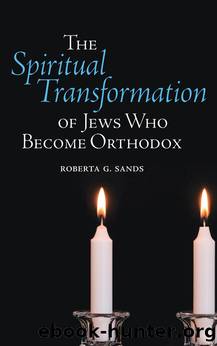The Spiritual Transformation of Jews Who Become Orthodox by Roberta G. Sands;

Author:Roberta G. Sands;
Format: epub
Publisher: State University of New York Press
Published: 2019-04-14T16:00:00+00:00
Parenting
Parenting beliefs and practices are strongly influenced by the cultures in which parents were raised and in which they live (Bornstein, 2013). These cultures provide norms, values, behaviors, practices, and symbols that are shared by a collectivity and transmitted to the next generation, that is, âcultural scriptsâ (Bornstein, 2013). When baalei teshuvah become parents, they face the challenge of learning about, internalizing, and transmitting norms of their adopted culture to their children. For American Jewish parents whose own parents and culture have emphasized achievement, individualism, and secular learning, taking on new norms that put Torah in the center is a difficult transformation.
The BTs in this study felt disadvantaged because they were not raised in homes in which their parents transmitted Orthodox Judaism to them from an early age, and thus they did not know the cultural scripts, the ways insiders communicate norms (Goddard & Wierzbicka, 2004). Lacking early socialization and role models, they did not know what to teach, when, and how to convey these practices to their children. Still learning themselves, they felt inadequate to perform the job of parenting. As Karen, who had her child at age forty, said when her son was a year old:
My biggest concern right now is my child. Neither one of us grew up with role models that we would want our child to grow up with. And itâs really hard. And Iâm really scared about that, and making sure that ⦠heâs learning what I want him to learn. And what I feel he should be. ⦠I donât [know], just the stupid little things. When do you start teaching a kid brachos? Okay, so I can read in a book, when they start to talk, or whatever. But you know what I mean; I donât have that real life experience.
As Karen suggests, she is at a loss on how to raise a child to be frum. What comes naturally to those who had Orthodox parental role models is a daunting responsibility for her.
Regardless of oneâs religious orientation, becoming a new parent is stressful (Stamp, 2003). Parent education is not a usual part of elementary, high school, and college curricula. Suddenly one is responsible for a human life! New parents learn how to care for children from what they have observed in their parental homes, media representations, and advice from family and friends (Bornstein, 2013). They also learn from observing parents of friends. According to attachment theory, individuals draw from such sources to develop internal working models or images of how to parent (Sroufe & Fleeson, 1986). Parents also learn by doingâenacting the role and examining the consequences.
In reflecting on their journeys, participants in this study asserted that Orthodox Judaism was attractive to them because it provides a good framework, meaning system, and structure for raising children. Joshua, who objected to Hebrew School when he was a child, said that after being Orthodox for twenty-five years and seeing how well his children are developing in an Orthodox religious environment, he is convinced that the decision to become Orthodox was correct.
Download
This site does not store any files on its server. We only index and link to content provided by other sites. Please contact the content providers to delete copyright contents if any and email us, we'll remove relevant links or contents immediately.
| Conservative | Orthodox |
| Reform |
The Power of Habit by Charles Duhigg(3129)
Man's Search for Meaning by Viktor E. Frankl(2669)
Mckeown, Greg - Essentialism: The Disciplined Pursuit of Less by Mckeown Greg(2440)
MOSES THE EGYPTIAN by Jan Assmann(2412)
Devil, The by Almond Philip C(2325)
The Complete Dead Sea Scrolls in English (7th Edition) (Penguin Classics) by Geza Vermes(2277)
Unbound by Arlene Stein(2268)
I Capture the Castle by Dodie Smith(2034)
Schindler's Ark by Thomas Keneally(1879)
The Invisible Wall by Harry Bernstein(1799)
The Gnostic Gospel of St. Thomas by Tau Malachi(1794)
The Bible Doesn't Say That by Dr. Joel M. Hoffman(1677)
The Secret Doctrine of the Kabbalah by Leonora Leet(1607)
Political Theology by Carl Schmitt(1577)
The Jewish State by Theodor Herzl(1533)
A History of the Jews by Max I. Dimont(1529)
The Dead Sea Scrolls Bible by Martin G. Abegg(1513)
The Book of Separation by Tova Mirvis(1485)
Oy!: The Ultimate Book of Jewish Jokes by David Minkoff(1369)
